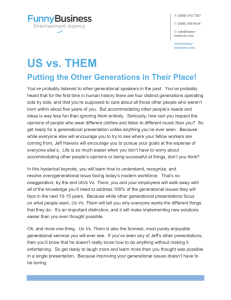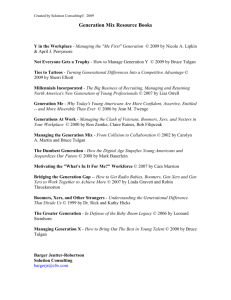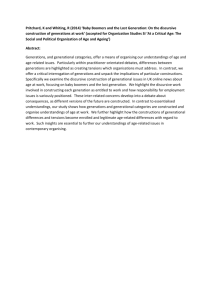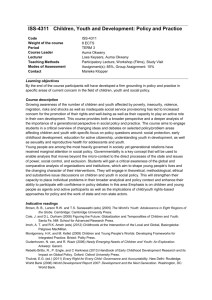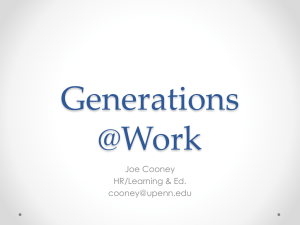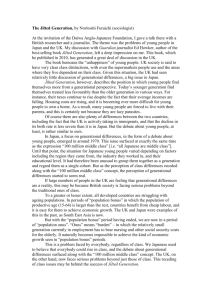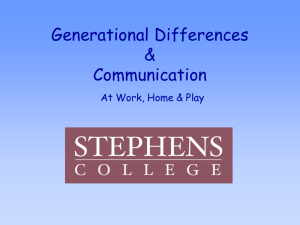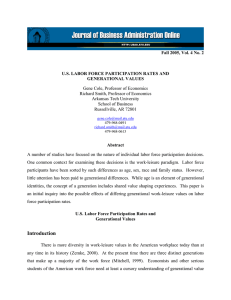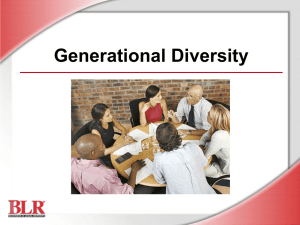generational differences?
advertisement
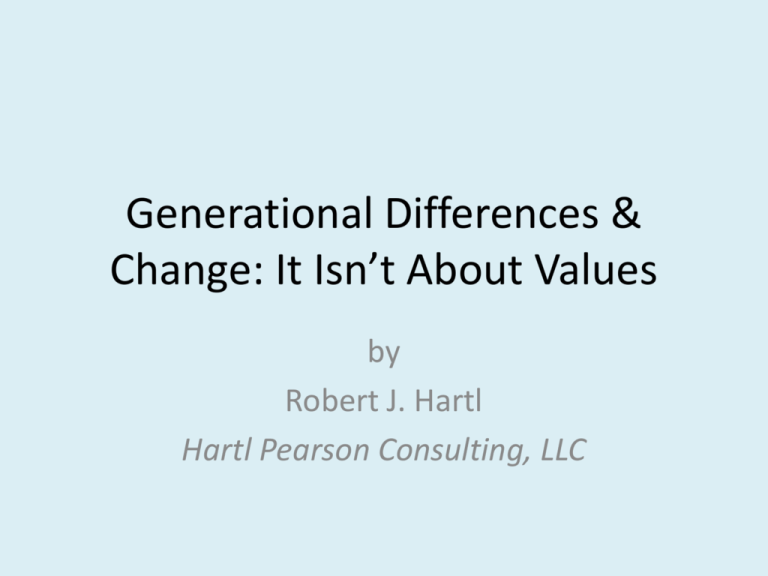
Generational Differences & Change: It Isn’t About Values by Robert J. Hartl Hartl Pearson Consulting, LLC Age Cohorts – Viewed from the “Different Values” Hypothesis Traditionalists (1900 –1945) Experienced Great Depression and two world wars Loyal, hardworking, financially conservative and faithful to institutions Many have already retired or are approaching retirement Some have returned from retirement to work part-time jobs Baby Boomers (1946 – 1964) Challenged the status quo when they entered job market; responsible for many of the rights and opportunities now taken for granted Competed against each other for jobs; created the 60 hour work week (believing that hard work would get them ahead); identities are connected to work Skilled at dealing with organizational politics Cohorts Described (continued) Gen Xers (1965 – 1980) Good with technology – grew up with video games/computers Skeptical about/distrust institutions (based on observation of parents’ divorce rates, layoffs, and challenges to institutions) Don’t expect loyalty from employers and therefore change jobs more frequently than earlier generations Work isn’t the most important thing in their lives; they work hard, but go home at 5:00 PM - try to maintain greater balance than parents Millennials (1981 – 1999) The youngest are still in school; some have entered workforce Grew up around cell phones, pagers, and personal computers They are enthusiastic learners who question things; have self-confidence and high self-esteem; collaborators who prefer teamwork Don’t like boundaries or constraints on their job descriptions Xers change jobs, but Millennials are likely to change careers What is the age profile of the US? Do generational differences play a role in how we work together? • Many people believe they do. • Early research suggested that behavioral differences across age cohorts could be explained by different values, reflecting the unique world events and experiences of each group. • More recent research has found that other factors like “career stage,” personality and motivation may offer a better explanations for behavioral differences. More Recent Research Results are not supportive of generational stereotypes that have been pervasive in the management literature and the media. Specifically, few meaningful differences were found between the three generations. Moreover, even when differences were observed, these have related more to age rather than generational differences. - Wong, Gardiner, Lang, & Coulon (2008) Research (continued) Consistent with our expectations, results revealed that the generations were similar on seven of ten work values examined. Differences were only found for 3 of 4 values predicted to exhibit a difference between generations (career advancement, diversity, and immediate feedback and recognition). …findings supported the contention that similarities would outweigh differences regarding the role of generations on the relationships between employee perceptions of the work factors and the importance of work factors on attitudinal reactions. - Mencl & Lester (2014) By the way, what’s an attitude? Evaluative statements, either favorable or unfavorable, concerning objects, people, or events. - Robbins & Judge (2014) From our perspective, one explanation is particularly helpful in offering explanations for why the generational groups behave in different ways: “stage of life cycle.” (60-65) Late Adulthood Concept of the Life Cycle Adapted from D. Levinson as presented in “The Seasons of a Man’s Life” Late Adult Transition Middle Adulthood (40-45) Mid-life transition Early Adulthood (17-22) Early Adult Transition (0-3) Early Childhood Transition Childhood & Adolescence …another concept that may help account for how we perceive “generational differences” is what our friend Edgar Schein referred to as the dimensions of career dynamics. Edgar Schein’s Dimensions of Career Dynamics Dimensions: Hierarchical Expertise/function Inclusion/membership 4 1 1 =Engineer 2= Project Engineer 3 2 3=Manager 4=Mentor Career Anchors (defined by Edgar Schein) Concept of an Anchor: The pattern of self-perceived talents, motives and values – serves to guide, constrain, stabilize, and integrate the person’s career. The Anchors: – – – – – – – – Technical /Functional Competence General Managerial Competence Autonomy/Independence Security/Stability Entrepreneurial Creativity Service/Dedication to a Cause Pure Challenge Lifestyle What do you think? • Are generational differences a factor in your life or workplace? • What are your thoughts about what best explains the so-called “differences?” Creating Cultural Islands to Bridge Generational Differences • A cultural island is an environment in which people suspend the need to maintain face. • They explore their tacit assumptions, especially those about authority & intimacy. • One easily created cultural island is a “dialogue.” Dialogue… Is about shared inquiry, a way of thinking and reflecting together. It is not something you do to another person. It is something you do with people. …this has to do with learning to shift your attitudes about relationships with others, so that we gradually give up the effort to make them understand us, and come to a greater understanding of ourselves and each other. - William Isaacs Why use dialogue? • To learn what we and others think • To get beneath the cultural assumptions that limit our understanding • To create collective knowledge • As a basis (or foundation) for addressing issues that we may have previously considered problems Anatomy of a Dialogue Circle Dialogue Process (Adapted from Schein) Make all your remarks to the campfire; do not look at each other. Do not feel obligated to ask others for clarification even if you haven’t understood them. Do not feel obligated to answer questions that someone asks you directly. Examples of Dialogue Prompts • What are your thoughts about “generational differences?” • Talk about the extent to which you believe generational differences influence work in your organization. • What are the steps you have taken in your organization to deal with problems associated with generations differences? • What can be done to improve communications across and between generational groups? Ideas for Improving Communication • Xers to use with Boomers: – – – – Show respect Use face-to-face communication Play the political game Learn about the organization’s history • Boomers to use with Xers: – – – – – Get to the point (avoid jargon & buzzwords) Use emails but be concise Give them space Get over the concept of “paying dues” “Lighten-up” • Boomers & Xers to use with Millenials: – – – – – Challenge them/offer more responsibility Ask their opinions Create opportunities to collaborate Use mentors Provide timely feedback References • Mencl, J., & Lester, S. W. (2014, August). More alike than different: What generations value and how the values affect employee workplace perceptions. Journal of Leadership & Organizational Studies, 21(3), 257-272. • Robbins, S. P., & Judge, T. A. (2014). Essentials of organizational behavior (12 ed.). Boston, MA: Pearson. • Wong, M., Gardiner, E., Lang, W., & Coulon, L. (2008). Generational differences in personality and motivation: Do they exist and what are the implications for the workplace? Journal of Managerial Psychology, 23(8), 878890. Contact Information hartlpearsonconsulting@gmail.com …or rhartl@css.edu
